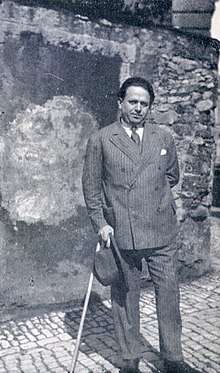
Kurt Tucholsky in Paris 1928
Kurt Tucholsky (9 January 1890 – 21 December 1935) was a German journalist, satirist and lyricist.
Quotes
- Der Mensch gönnt seiner Gattung nichts, daher hat er die Gesetze erfunden. Er darf nicht, also sollen die andern auch nicht.
- Translated: Mankind doesn't grant itself anything—that is why it has invented the law. It isn't allowed for him so it shouldn't be allowed for others.
- From Der Mensch, published 1931.
- Der Mensch hat neben dem Trieb der Fortpflanzung und dem, zu essen und zu trinken, zwei Leidenschaften: Krach zu machen und nicht zuzuhören.
- Translated: Man has—next to the drives of reproduction and dining—two passions: making noise and not listening.
- From Der Mensch, published 1931.
- Da gab es vier Jahre lang ganze Quadratmeilen Landes, auf denen war der Mord obligatorisch, während er eine halbe Stunde davon entfernt ebenso streng verboten war. Sagte ich: Mord? Natürlich Mord. Soldaten sind Mörder.
- Translated: For four years, there were whole square miles of land where murder was obligatory, while it was strictly forbidden half an hour away. Did I say: murder? Of course murder. Soldiers are murderers.
- From Der bewachte Kriegsschauplatz, published 1931 under the pseudonym Ignaz Wrobel; compare .
- Die menschliche Dummheit ist international.
- Translated: Human stupidity is international.
- "Hégésippe Simon" (1931); also in Schnipsel, published 1973, p. 102.
- Darauf sagt ein Diplomat vom Quai d’Orsay: «Der Krieg? Ich kann das nicht so schrecklich finden! Der Tod eines Menschen: das ist eine Katastrophe. Hunderttausend Tote: das ist eine Statistik!»
- At which a diplomat from France replies: «The war? I can't find it too terrible! The death of one man: that is a catastrophe. One hundred thousand deaths: that is a statistic!»)
- "Französischer Witz" (1932).
- Im übrigen gilt ja hier derjenige, der auf den Schmutz hinweist, für viel gefährlicher als der, der den Schmutz macht.
- Translated: Furthermore, here the one pointing out the filthiness is perceived as much more dangerous than the one producing the filth.
- Letter to Herbert Ihering, August 10. 1922
External links
This article is issued from
Wikiquote.
The text is licensed under Creative
Commons - Attribution - Sharealike.
Additional terms may apply for the media files.